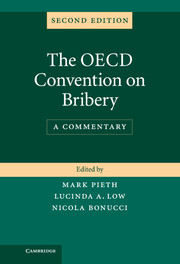Book contents
- Frontmatter
- Contents
- Notes on Contributors
- Foreword
- Acknowledgements
- Abbreviations
- Part I Introduction
- Part II Commentary
- Article 1 The Offence of Bribery of Foreign Public Officials
- Article 2 The Responsibility of Legal Persons
- Article 3 Sanctions
- Article 3(3) Seizure and Confiscation
- Article 4 Jurisdiction
- Article 5 Enforcement
- Article 6 Statute of Limitations
- Article 7 Money Laundering
- Article 8 Accounting
- Articles 9–11 International Co-operation
- Article 12 Monitoring and Follow-up
- Articles 13–17 Final Provisions
- Part III The Convention in Practice
- Annex OECD Documents
- Consolidated Bibliography
- Index
- References
Article 2 - The Responsibility of Legal Persons
from Part II - Commentary
Published online by Cambridge University Press: 05 March 2015
- Frontmatter
- Contents
- Notes on Contributors
- Foreword
- Acknowledgements
- Abbreviations
- Part I Introduction
- Part II Commentary
- Article 1 The Offence of Bribery of Foreign Public Officials
- Article 2 The Responsibility of Legal Persons
- Article 3 Sanctions
- Article 3(3) Seizure and Confiscation
- Article 4 Jurisdiction
- Article 5 Enforcement
- Article 6 Statute of Limitations
- Article 7 Money Laundering
- Article 8 Accounting
- Articles 9–11 International Co-operation
- Article 12 Monitoring and Follow-up
- Articles 13–17 Final Provisions
- Part III The Convention in Practice
- Annex OECD Documents
- Consolidated Bibliography
- Index
- References
Summary
Responsibility of Legal Persons
Each Party shall take such measures as may be necessary, in accordance with its legal principles, to establish the liability of legal persons for the bribery of a foreign public official.
Sanctions
The bribery of a foreign public official shall be punishable by effective, proportionate and dissuasive criminal penalties. The range of penalties shall be comparable to that applicable to the bribery of the Party's own public officials and shall, in the case of natural persons, include deprivation of liberty sufficient to enable effective mutual legal assistance and extradition.
In the event that, under the legal system of a Party, criminal responsibility is not applicable to legal persons, that Party shall ensure that legal persons shall be subject to effective, proportionate and dissuasive non-criminal sanctions, including monetary sanctions, for bribery of foreign public officials.
Each Party shall take such measures as may be necessary to provide that the bribe and the proceeds of the bribery of a foreign public official, or property the value of which corresponds to that of such proceeds, are subject to seizure and confiscation or that monetary sanctions of comparable effect are applicable.
Each Party shall consider the imposition of additional civil or administrative sanctions upon a person subject to sanctions for the bribery of a foreign public official.
- Type
- Chapter
- Information
- The OECD Convention on BriberyA Commentary, pp. 212 - 251Publisher: Cambridge University PressPrint publication year: 2013



